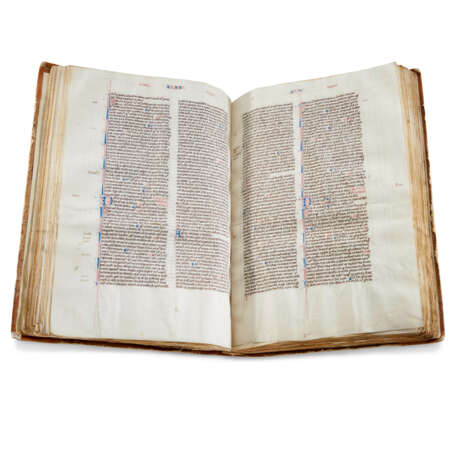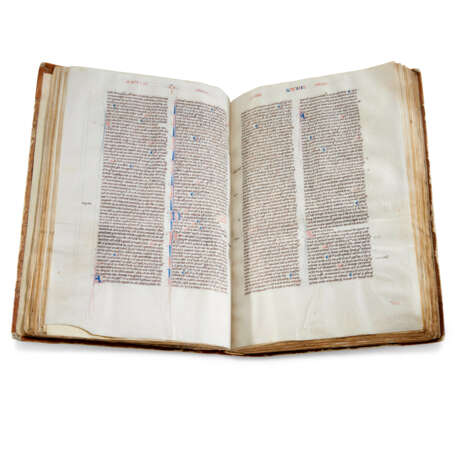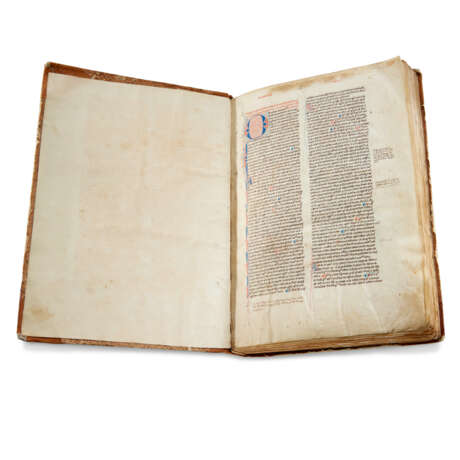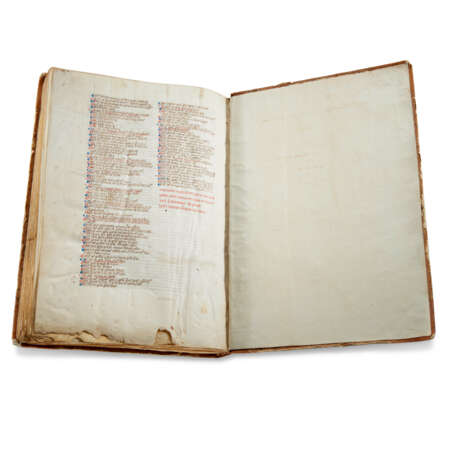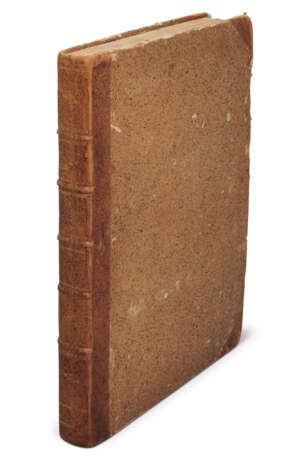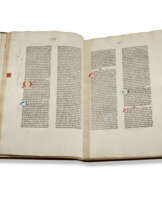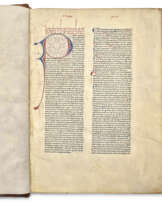ID 993149
Лот 42 | Thomas Aquinas (c.1225-1274)
Оценочная стоимость
£ 30 000 – 50 000
Summa theologica, Prima secundae, in Latin, decorated manuscript on vellum [Paris, final quarter 13th century]
A handsome, large-format, complete university copy of the magnum opus of Aquinas' theology, composed shortly after his death, and copied by the so-called pecia system, with extensive marginal annotations and cross-referencing.
360 x 250mm. 160 leaves, complete, collation: 1-1312, 144, with signature marks (a-o) on the first six folios of each gathering and catchwords framed in red in lower margins of final versos, pecia notes on ff.21, 71 and 76v, two columns of 59 lines, ruled space: 270 x 175mm, headings and rubrics in red, text capitals touched red, chapter numbers in heading of letters alternately blue and red, paragraph marks and two-line initials alternately blue and red with flourishing of the other colour, one eight-line and 114 three-line puzzle initials with penwork flourishing of both colours and text-height cusped baguettes of red and blue (erasure of ownership inscription in upper margin of first folio and below colophon, minimal rodent damage to lower outer corner of final folios). 19th-century speckled sheep-backed boards (scuffed at lower edges).
Provenance:
(1) 'Johannes Scotus': the scribe identifies himself in the colophon that follows the Chapter list. This Johannes Scotus was perhaps an early member of a family of Paris booksellers represented by the scribe Guillaume Lescot, recorded in 1317, and the booksellers Nicolas (1323) and Robert (d.1347), see R.H and M.A. Rouse, Manuscripts and their Makers. Commercial Book Producers in Medieval Paris 1200-1500, 2000, II, pp.42, 102, 131.
(2) Count Giacomo Manzoni (1816-189), Rome: a letter pasted inside the upper cover of a Bolognese Aquinas, lot 10 at the 2000 Christie's sale (see below), dated 14 February 1880 records Manzoni's purchase of that manuscript with two others, including this one, thirty years earlier in Savoy from a man who had acquired them in France. The letter was written by Manzoni to Giuseppe Oreglia of the Society of Jesus in Rome. It informed him that three scholastic manuscripts owned by Manzoni were being brought to him. Manzoni was perhaps seeking Oreglia's opinion on the date and origin of the manuscripts: in the letter he suggested that all three were French and of the mid-14th century. Oreglia, of the community of La Civiltà Cattolica, had, when still a student, assisted with the foundation of the periodical of that name and continued to write for it throughout his life. Oreglia may have been consulting the manuscripts in connection with his researches.
Manzoni had played a prominent part in the movement for the independence and unification of Italy: he took part in all the campaigns in the Veneto in 1848 and when the Repubblica Romana was proclaimed in 1849 he was made Finance Minister. In an effort to get funds Manzoni was involved in negotiations with Palmerston that would have resulted in the sale of the treasures of the Vatican galleries and museums. His refusal to allow this hastened the inevitable fall of the Republic. He fled Rome, joined Garibaldi in San Marino and then moved to Corfu. During his exile and travels Manzoni expanded the library that he had inherited from his great-uncle Bartolomeo Borghese: his purchases included the Biblioteca Mostra, bought in Corfu, the collection of Guglielmo Libri and a considerable number of books bought after the sale of the Wellesley library. Manzoni returned to Rome in 1874 and at his death there he owned 25,000 volumes. His wish that the collection should remain intact was not fulfilled, and it was sold by G. Sangiorgi in the Palazzo Borghese: Catalogue de la bibliothèque de feu M. le comte Jacques Manzoni, 4 parts Città di Castello 1892-94. There were 220 manuscript volumes in the collection and 186 of these were offered for sale on 23 and 25 April 1894: the catalogue did not include the present manuscript.
(3) Shelf-mark R.II.19 inside upper cover and No 9 on front endleaf.
(4) English private collection, sold at Christie's, 29 November 2000, lot 11.
Content: Prima secundae of the Summa theologica of Thomas Aquinas ff.1-157v, followed by a list of chapter headings ff.157v-160v.
The Summa theologica, the second of Aquinas's total statements of theology, is regarded as the epitome of Thomist theology. His own description of the Summa, that it treats 'first of God, secondly of the journey to God of reasoning creatures, thirdly, of Christ, who, as man, is our road to God' is a disarmingly simple summary of a work of some 3,000 articles which creates a structure of faith of dizzying scale and detail, the imposing realisation of Aquinas's lifelong synthesising of Aristotle and the Christian tradition, natural reality and the divine, faith and reason. The composition of the Summa theologica occupied the last seven years of Aquinas's life; he left it unfinished when he renounced his writings shortly before his death. His work on the second part may be dated to his last period in Paris, 1268-1273: the Prima secundae treats of man's final end and general moral themes, leaving the consideration of particular virtues and vices to the Secunda secundae.
With its extensive marginal notes and cross-references, this is a classic and handsome example of a text-book produced in Paris by the professional and well-organised book-trade that served the university, but most interestingly it is a rare survival of the pecia system by which these university texts were copied. 'The pecia system operated under the auspices of special bookdealers, or university stationers, who owned copies of text books required in the curriculum. These copies were divided into pieces, each of which was numbered separately and could be rented out to individuals who needed an exemplar from which to copy the text. Several scholars could copy from one complete text at the same time, speeding up production. The system also attempted to guarantee purity of the text, since each new copy was a direct descendant of the stationer's "fair" copy' (B. Shailor, The Medieval Book, Catalogue of an Exhibition at the Beinecke Rare Book & Manuscript Library, 1988, p.98). The pecia notes in our manuscript survive on f.21 'viii pecia fi[ni]ta'; f.71 'xxvii. pe[cia]' and f.76v 'xxx'. Two Paris bookseller lists of pecia-produced works survive from 1275 and 1304 (both contained in Chartularium Universitatis Parisiensis, Paris, 1889-97, the 1275 list in I, pp.644-650 and the 1304 list in II, pp.107-112). The lists contain the prescribed reading of the university curriculum as well as popular works, with texts divided between theology, canon law and philosophy. Aquinas' Prima secundae appears as item number 50 (in 60 parts) in the 1275 list; and the Secunda secundae is item 51 (in 82 parts).
Although a popular and practical system, surviving specimens are extremely rare (on the system, see J. Destrez, La Pecia dans les Manuscrits Universitaires du XIIIe e du XIVe siècle, 1935; G. Pollard, 'The Pecia System in Medieval Universities', Medieval Scribes, Manuscripts and Scholars, 1978, pp.145-161; C. de Hamel, A History of Illuminated Manuscripts, 1994, pp.130-140; and, most recently and comprehensively, A. J. Ray, 'The pecia system and its use in the cultural milieu of Paris, c.1250-1330', PhD thesis, 2015).
Special notice
No VAT is payable on the hammer price or the buyer's premium for this lot. Please see the VAT Symbols and Explanation section of the Conditions of Sale for further information
| Автор: | Фома Аквинский (1225 - 1274) |
|---|---|
| Место происхождения: | Западная Европа, Франция, Европа |
| Категория аукционного дома: | Манускрипты Средневековья и Ренессанса |
| Автор: | Фома Аквинский (1225 - 1274) |
|---|---|
| Место происхождения: | Западная Европа, Франция, Европа |
| Категория аукционного дома: | Манускрипты Средневековья и Ренессанса |
| Адрес торгов |
CHRISTIE'S 8 King Street, St. James's SW1Y 6QT London Великобритания | |
|---|---|---|
| Предосмотр |
| |
| Телефон | +44 (0)20 7839 9060 | |
| Комиссия | see on Website | |
| Условия использования | Условия использования |
